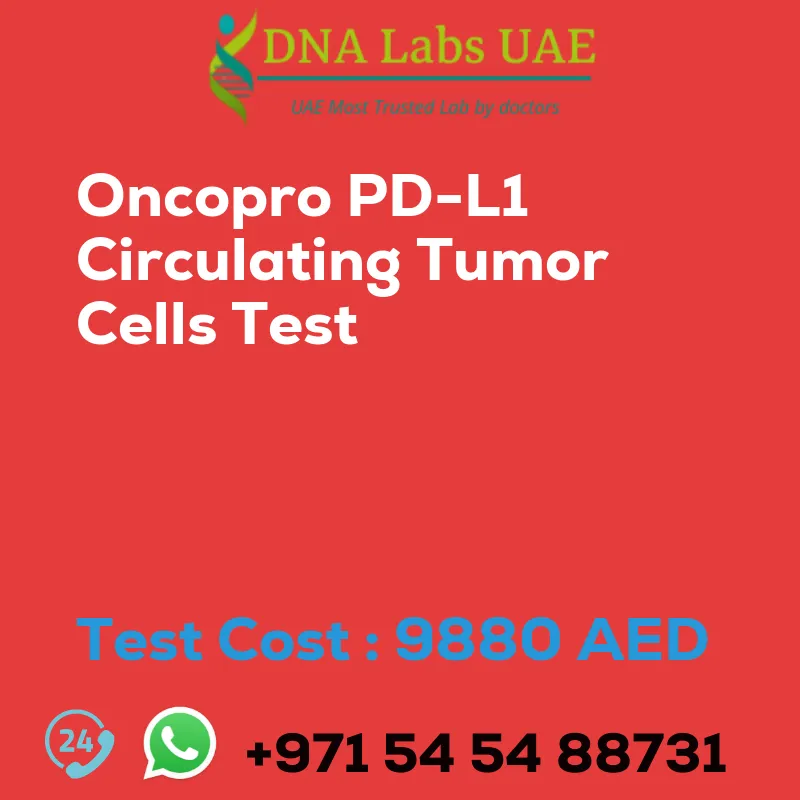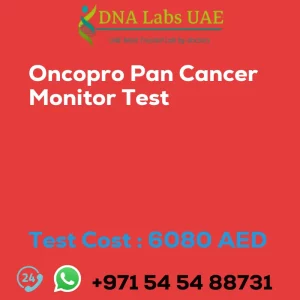ONCOPRO PD-L1 CIRCULATING TUMOR CELLS Test
Welcome to DNA Labs UAE, where we offer the ONCOPRO PD-L1 CIRCULATING TUMOR CELLS Test. This diagnostic test is designed to detect the presence of circulating tumor cells (CTCs) in the blood of patients with cancer.
Test Cost
The cost of the ONCOPRO PD-L1 CIRCULATING TUMOR CELLS Test is AED 9880.0.
Symptoms and Diagnosis
If you are experiencing symptoms of cancer or have been diagnosed with cancer, the ONCOPRO PD-L1 CIRCULATING TUMOR CELLS Test can provide valuable information about the progression of the disease. By analyzing a small blood sample, the test can detect the presence of CTCs and identify the expression of PD-L1, a protein commonly found on the surface of cancer cells.
Sample Condition
To ensure accurate results, please provide an 8 mL whole blood sample in a Lavender Top (EDTA) tube. A sample collection kit is available from LPL, which includes the necessary preservative. Use a syringe and needle to add the preservative to the EDTA tube. It is important to ship the sample immediately at 18-22°C and avoid refrigeration or freezing. Additionally, please fill out the OncoPro Liquid Biopsy Clinical Information Form (Form 32) in its entirety.
Report Delivery
After the sample has been analyzed, the report will be delivered within 21 working days.
Method and Test Type
The ONCOPRO PD-L1 CIRCULATING TUMOR CELLS Test involves extraction and staining methods to detect CTCs and PD-L1 expression. This test is specifically designed for cancer diagnosis.
Doctor and Test Department
The ONCOPRO PD-L1 CIRCULATING TUMOR CELLS Test is typically ordered by an oncologist and is performed in the Molecular Diagnostics department.
Pre Test Information
Prior to taking the ONCOPRO PD-L1 CIRCULATING TUMOR CELLS Test, it is mandatory to fill out the OncoPro Liquid Biopsy Clinical Information Form (Form 32).
Test Details
The ONCOPRO PD-L1 CIRCULATING TUMOR CELLS Test is a non-invasive procedure that provides valuable information for guiding treatment decisions and improving outcomes for patients with cancer. By detecting CTCs in the blood, the test can identify the presence of PD-L1 expression, allowing oncologists to better understand the progression of the disease. This information can help determine the most appropriate treatment options for each patient.
Thank you for choosing DNA Labs UAE for your ONCOPRO PD-L1 CIRCULATING TUMOR CELLS Test. If you have any further questions or would like to schedule an appointment, please contact our office.
| Test Name | ONCOPRO PD-L1 CIRCULATING TUMOR CELLS Test |
|---|---|
| Components | |
| Price | 9880.0 AED |
| Sample Condition | 8 mL whole bloodin 1 Lavender Top (EDTA) tube in sample collection kit available from LPL. Add the preservative supplied in the kit to the EDTA tube using a syringe & needle. Ship immediately at 18\u0192??22?\u00f8C. DO NOT REFRIGERATE OR FREEZE. Duly filled OncoPro Liquid Biopsy Clinical Information Form (Form 32) is mandatory.\n. |
| Report Delivery | 21 Working Days |
| Method | Extraction, Staining |
| Test type | Cancer |
| Doctor | Oncologist |
| Test Department: | MOLECULAR DIAGNOSTICS |
| Pre Test Information | Duly filled OncoPro Liquid Biopsy Clinical Information Form (Form 32) is mandatory. |
| Test Details |
The Oncopro PD-L1 Circulating Tumor Cells Test is a diagnostic test that is used to detect the presence of circulating tumor cells (CTCs) in the blood of patients with cancer. CTCs are cancer cells that have detached from the primary tumor and entered the bloodstream, potentially spreading to other parts of the body and causing metastasis. The test works by using a specialized antibody to detect the presence of PD-L1, a protein that is often expressed on the surface of cancer cells. By identifying CTCs that express PD-L1, the test can help oncologists to better understand the progression of the disease and to determine the most appropriate treatment options. The Oncopro PD-L1 Circulating Tumor Cells Test is a non-invasive procedure that involves taking a small blood sample from the patient. The sample is then analyzed in a laboratory to identify the presence of CTCs and PD-L1 expression. Overall, the test can provide valuable information to help guide treatment decisions and improve outcomes for patients with cancer. |







